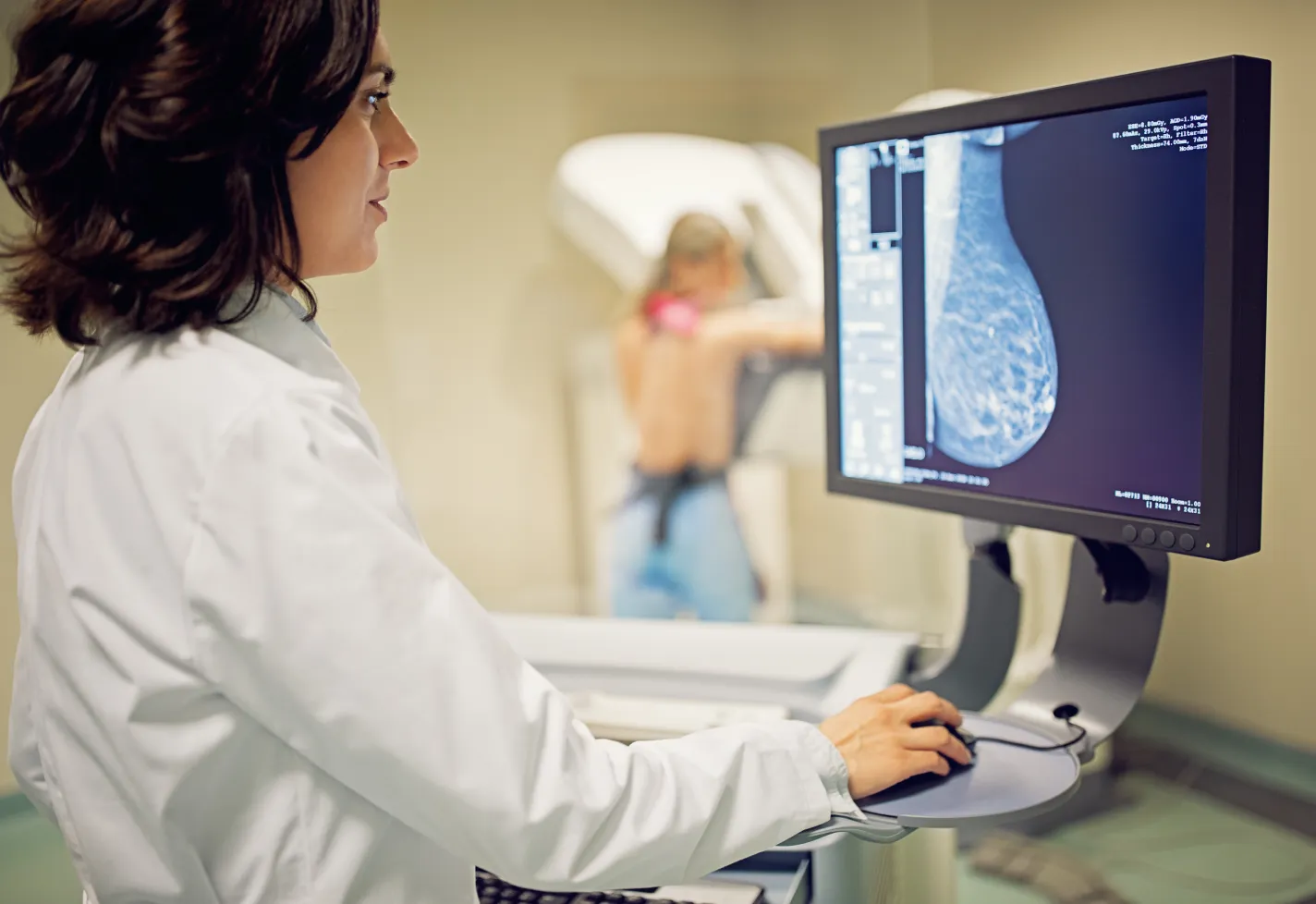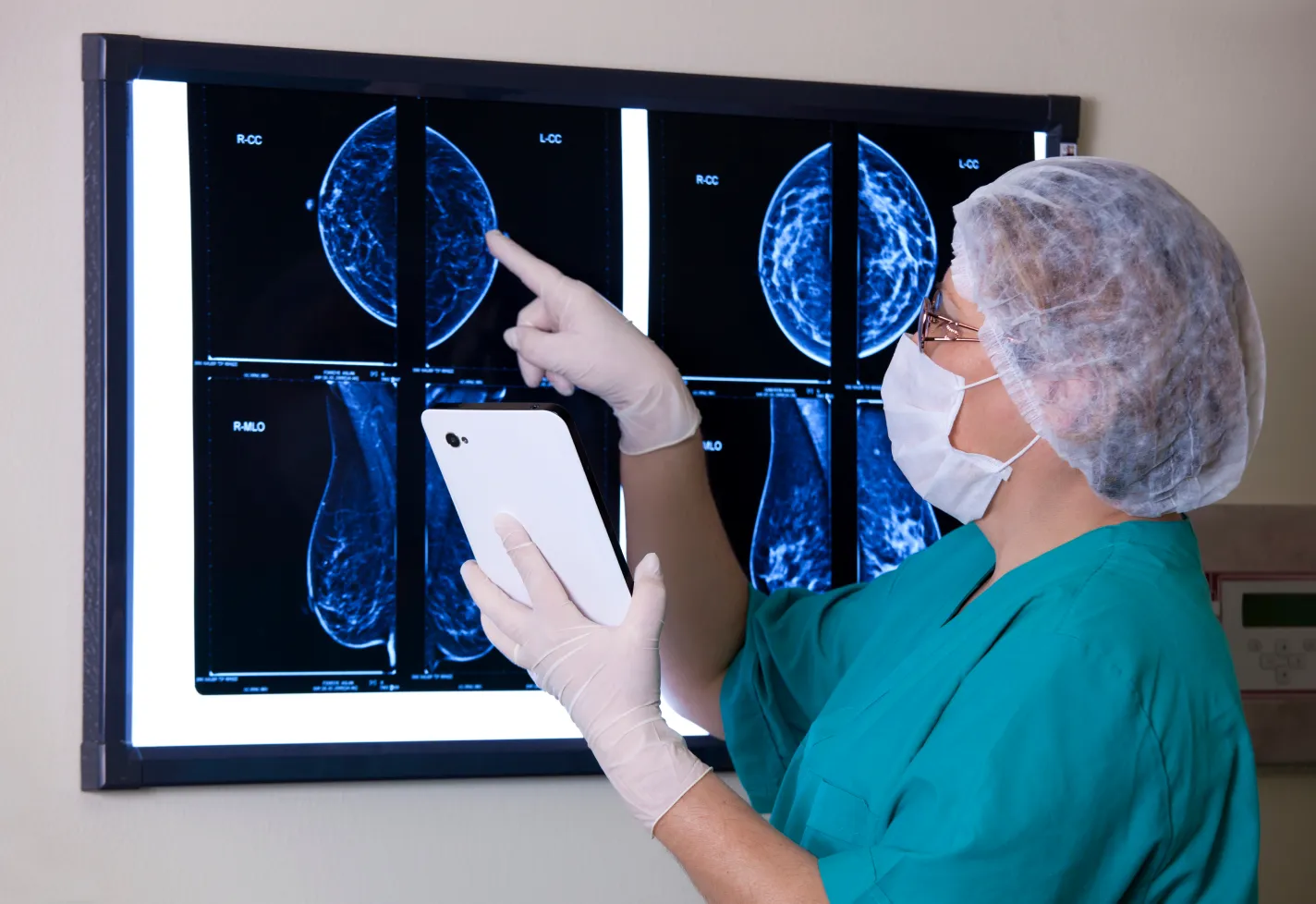Mammograms
Mammograms can save lives.
Our goal is to make it easy for you to schedule your annual mammogram whenever and wherever it makes sense based on your needs. Many of our locations offer evening and weekend hours and allow you to schedule your mammogram without a referral from your primary care provider.
We also offer mobile mammography events to bring essential breast screening close to where you live and work.
What is a mammogram?
A mammogram is a specialized, low-dose X-ray of your breasts.
Getting an annual mammogram is one of the simplest, yet most powerful tools available to detect and diagnose breast cancer. At Novant Health, we use the latest in mammogram technology to provide remarkably detailed and precise images of your breasts. This allows us find breast cancer as early as possible, sometimes even up to three years before you start having symptoms. Cancers tend to be easiest to treat when they are discovered early, before they have a chance to spread. Early detection with a mammogram can also help make it so you need fewer breast biopsies later.

Who Should Get a Mammogram?
Even if you don't have any symptoms of breast cancer, you should get a mammogram each year if you are:
- Assigned female at birth
- 40 years old or older
However, if your mom or sister got breast cancer before they hit menopause, you should start getting annual mammograms 10 years before the age that family member was when they were diagnosed with breast cancer. For example, if your mom was diagnosed with breast cancer when she was 45, you should start getting annual mammograms when you turn 35.

Difference Between Screening & Diagnostic Mammograms
Screening mammograms
A screening mammogram is your routine mammogram that you get each year starting when you turn 40. You get a screening mammogram when you have no:
- Breast condition symptoms
- Prior history of breast cancer
- Prior lumpectomies
Diagnostic mammograms
A diagnostic mammogram is an enhanced scan that can show the detail of smaller areas, different angles of breast tissue, or other variations as needed. Your care team may refer you for a diagnostic mammogram if you have a:
- Routine screening mammogram that shows changes in your breast tissue
- Previous breast cancer diagnosis
- New concern in your breasts, such as:
- Lumps
- Abnormal breast pain, soreness, or sensitivity
- Drainage
What to Expect

- Screening mammogram: If you are 40 years old or older, you do not need a referral or order from your provider to schedule.
- Diagnostic mammogram: You need a referral to schedule. Your care team can help you schedule this as needed.
Consider scheduling your annual mammogram for one week after your period — your breasts can be more tender the week before and of your period.

- Do not use deodorant, powder, or lotion under your arms or on your breasts.
- Remove any necklaces and chest/torso piercings.
- Wear a top that is easy to remove and shoes that are comfortable to stand in.
- Be prepared to answer questions about your medical history.
- Inform your technologist if you have:
- Breast implants
- Different mobility abilities
- Unless your care team tells you otherwise, you may eat and take your medications normally on the day of your scan. You may want to:
- Have less caffeine the days before your appointment. (Caffeine can make your breasts more tender.)
- Take pain medicine an hour before your scan.

Tell your care team if you are pregnant, think you may be pregnant, or are breastfeeding. They may suggest a different exam, such as an MRI or ultrasound.

A routine mammogram takes about 30 to 45 minutes. Typically, two images are taken per breast.
- You will undress from the waist up and stand in front of a specialized X-ray machine.
- A technologist will place one of your breasts between two X-ray plates.
- The X-ray plates will firmly compress your breast to take clear images. This compression can:
- Be uncomfortable, but typically only lasts about 10 to 15 seconds per image
- Cause temporary skin discoloration for a little while after your exam
- You'll do the same process with the other breast.
- Your technologist will check your images to make sure you don't need any retakes.
You can speak to your technologists about any concerns you may have at any time during the procedure.

- Screening mammogram: Most insurance plans cover your routine mammogram if you are 40 or older and it's been one or two years since your last mammogram.
- Diagnostic mammogram: Check your coverage and expected cost with your insurance company.
Be sure to take advantage of our many free healthcare cost resources — including financial navigators — to learn more.

While you don't need a referral for a routine mammogram, you do need to have an established relationship with a primary care provider or ob-gyn to receive your results. Once a radiologist reviews your mammograms, they'll report the results to your provider. Your provider will contact you to discuss your results and any next steps needed.
Take advantage of Novant Health MyChart to:
- View your imaging results as soon as they’re available
- Contact your doctor
- Schedule appointments

Do you qualify for a mammogram grant?
If you do not have insurance and cannot afford a mammogram, call us to see if you qualify for a grant to pay for one:
- Charlotte/Rowan area: 704-384-5250 (para Español: 704-384-8202)
- Wilmington area: 910-662-9055
- Winston-Salem area: 336-397-6017

We bring mammography services to you.
Want to bring mammograms to your community or work? You can with Novant Health’s mobile mammography, a special 38-foot bus that travels to you. Our goal is to ensure everyone has access to high-quality breast health services, regardless of ability to travel to a full-service imaging center. Novant Health also offers mobile mammography events in various locations throughout the year.
To:
- Schedule a mobile mammography visit: call us at the following number.
- Find a mobile mammography event convenient to you: visit the mobile mammography events calendar.
